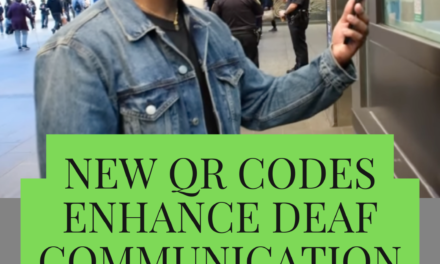Last year, Julie Yates from the Civil Rights Education and Enforcement Center (CREEC) shared some issues that incarcerated Deaf persons face within the prison system that set them apart from their hearing counterparts. Once the incarcerated person goes through an invasive intake process and arrives in their “block,” the person is usually granted the opportunity to make a phone call or told of when they are able to make one. While guards do inform incarcerated Deaf* persons that they can make calls, the access to equipment used for calls is almost always minimal to none and oftentimes unsatisfactory.
While some prisons do have teletypewriters [TTYs], TTYs are not considered effective for most incarcerated Deaf* persons. Yates stated that the CREEC are working with the National Association of the Deaf [NAD] to make sure incarcerated Deaf persons have “effective communication in prisons across the country.” There is no “one size fits all” solution when it comes to communication access, and the CREEC makes it clear that they are trying to make two different kinds of telecommunications equipment accessible for incarcerated Deaf* persons–videophones [VPs] and CapTel (captioned phones).
Many state Departments of Corrections don’t know what VPs or CapTel are and often fight against the concept of access for incarcerated persons, not because they do not want to provide access but because they are firmly convinced that what they already have in place is reasonable enough for the incarcerated person. Many Deaf people use American Sign Language [ASL] or any other sign language and English is their second language. Given that TTYs use English as communication between both parties on the call, it is frustrating and confusing for incarcerated Deaf* inmates who are not comfortable with English.
Several lawsuits have been filed in Colorado against the Colorado Department of Corrections (CDOC) over the lack of communication access for incarcerated Deaf* persons. In 2008, the U.S. Department of Justice proposed new rules for Title II of the Americans with Disabilities Act. As this applies to both state and federal governments, the NAD suggested that there be an addition to address opportunities for individuals incarcerated in prisons or jails to be able to make outgoing calls:
“28 C.F.R. § 35.161(d): A public entity that offers an applicant, participant, or member of the public the opportunity to make outgoing telephone calls on more than an incidental convenience basis shall make available, upon request, text telephones (TTYs), and other voice, text, and video-based telecommunications products and systems, such as videophones and captioned telephones for the use of an individual who is deaf or hard of hearing, or has a speech impairment.” (NAD – Rights of Deaf and Hard of Hearing Inmates)
Incarcerated persons have a few options when it comes to filing complaints against the Department of Corrections in their state. If the incarcerated person has tried all available solutions within the prison they are in and the outcome is not satisfactory, the NAD recommends that they contact the U.S. Department of Justice at the Civil Rights Division of 950 Pennsylvania Avenue NW, Disability Rights Section – NYAV, Washington D.C., 20530. Incarcerated persons also can contact CREEC at 303-797-7901 or intakes@creeclaw.org.






